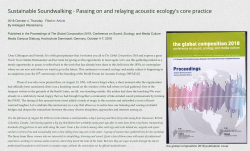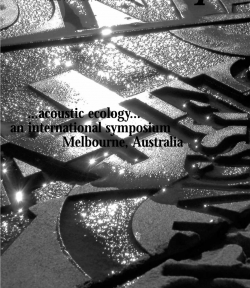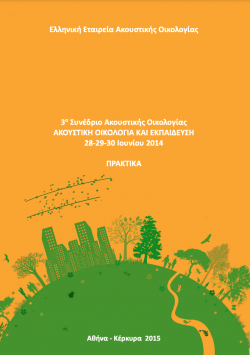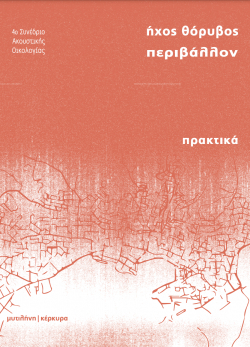Sustainable Soundwalking - Passing on and relaying acoustic ecology's core practice

Type
Publication
Authors
Westerkamp ( Hildegard Westerkamp )
Category
Conference Paper
[ Browse Items ]
Publication Year
2018
Abstract
Published in the Proceedings of The Global Composition 2018, Conference on Sound, Ecology, and Media Culture
Media Campus Dieburg, Hochschule Darmstadt, Germany, October 4-7, 2018
Dear Colleagues and Friends. It is with great pleasure that I welcome you all to The Global Composition 2018 and express a great Thank You to Sabine Breitsameter and her team for giving us this opportunity to meet again. Let’s use this gathering indeed as a timely opportunity to pause, to reflect back to the work that has already been done in this field since the 1970s, to contemplate where we are now and where we want to go in the future. This conference on sound, ecology and media culture is happening in an auspicious year, the 25th anniversary of the founding of the World Forum for Acoustic Ecology (WFAE).[1]
Those of you who were present then, on August 13, 1993, will never forget when, a short moment after the organization had officially been sanctioned, there was a knocking sound on the window of the hall where we had gathered. One of the frequent visitors to the grounds of the Banff Centre, an elk, was standing outside. His antlers had done the knocking! We were already in a celebratory mood, happy that we had brought together a community of like-minded sound professionals by forming the WFAE. The timing of this unusual sonic event added a touch of magic to the occasion and unleashed a wave of heart-warmed laughter. Let’s celebrate this anniversary in a way that allows us to notice how our listening and voicing can build bridges and deepen the connections between the many diverse disciplines, approaches and interests among us.
It is the afternoon of August 28, 2018 on Cortes Island, a small paradise, a day’s journey and three ferry rides away from Vancouver, British Columbia, Canada. I am leaning against a big log that floated here probably many years ago after it came loose from a log boom, transporting hundreds of logged trees to saw mills along the coast. I hear a few crickets among other such logs and rocks behind me, seagulls and oyster catchers in front of me and occasionally even a loon calling from way out on the water. A group of women have gathered here for the workshop The Story from Hear, women who are interested in storytelling, listening and sound. Quite a few of them came with years of professional experience, working in various media contexts, where they learnt the tools of the trade. But here they are eager to push through the learnt professional boundaries to tell stories in creative ways, without the restrictions set by official media formats.
I am hearing a helicopter pulsing in and out of the quiet among the surrounding islands, wondering whether this sound is related to the many forest fires in our province. After a few clearer days, I notice that smoke is moving in again. A distant boat motor mingles with the throb and then disappears. Now I hear the actual motor of the helicopter, as it comes closer, but nothing is straight forward about this sound. Motor and throb are processed in varying ways by the water and land formations, bouncing and reflecting here and there. Every detail is audible, allowing me to descend with my ears, my whole being, into this sound mix, that unfolds in front of me, mapping the sounds onto this landscape. Six Canada geese just passed right in front of me, flying at eye level through my ocean view frame, not even a metre above the sand, disrupting my helicopter sound map with their calls in flight.
The world needs to slow down--- is my thought at this moment. There is a sense of refreshment in such moments of listening, as if taking a deep breath. For once my time and space perception is in synch with the time and space that the sounds occupy. My mind is not racing ahead to comment and interpret, to plan or to meet a deadline...
Media Campus Dieburg, Hochschule Darmstadt, Germany, October 4-7, 2018
Dear Colleagues and Friends. It is with great pleasure that I welcome you all to The Global Composition 2018 and express a great Thank You to Sabine Breitsameter and her team for giving us this opportunity to meet again. Let’s use this gathering indeed as a timely opportunity to pause, to reflect back to the work that has already been done in this field since the 1970s, to contemplate where we are now and where we want to go in the future. This conference on sound, ecology and media culture is happening in an auspicious year, the 25th anniversary of the founding of the World Forum for Acoustic Ecology (WFAE).[1]
Those of you who were present then, on August 13, 1993, will never forget when, a short moment after the organization had officially been sanctioned, there was a knocking sound on the window of the hall where we had gathered. One of the frequent visitors to the grounds of the Banff Centre, an elk, was standing outside. His antlers had done the knocking! We were already in a celebratory mood, happy that we had brought together a community of like-minded sound professionals by forming the WFAE. The timing of this unusual sonic event added a touch of magic to the occasion and unleashed a wave of heart-warmed laughter. Let’s celebrate this anniversary in a way that allows us to notice how our listening and voicing can build bridges and deepen the connections between the many diverse disciplines, approaches and interests among us.
It is the afternoon of August 28, 2018 on Cortes Island, a small paradise, a day’s journey and three ferry rides away from Vancouver, British Columbia, Canada. I am leaning against a big log that floated here probably many years ago after it came loose from a log boom, transporting hundreds of logged trees to saw mills along the coast. I hear a few crickets among other such logs and rocks behind me, seagulls and oyster catchers in front of me and occasionally even a loon calling from way out on the water. A group of women have gathered here for the workshop The Story from Hear, women who are interested in storytelling, listening and sound. Quite a few of them came with years of professional experience, working in various media contexts, where they learnt the tools of the trade. But here they are eager to push through the learnt professional boundaries to tell stories in creative ways, without the restrictions set by official media formats.
I am hearing a helicopter pulsing in and out of the quiet among the surrounding islands, wondering whether this sound is related to the many forest fires in our province. After a few clearer days, I notice that smoke is moving in again. A distant boat motor mingles with the throb and then disappears. Now I hear the actual motor of the helicopter, as it comes closer, but nothing is straight forward about this sound. Motor and throb are processed in varying ways by the water and land formations, bouncing and reflecting here and there. Every detail is audible, allowing me to descend with my ears, my whole being, into this sound mix, that unfolds in front of me, mapping the sounds onto this landscape. Six Canada geese just passed right in front of me, flying at eye level through my ocean view frame, not even a metre above the sand, disrupting my helicopter sound map with their calls in flight.
The world needs to slow down--- is my thought at this moment. There is a sense of refreshment in such moments of listening, as if taking a deep breath. For once my time and space perception is in synch with the time and space that the sounds occupy. My mind is not racing ahead to comment and interpret, to plan or to meet a deadline...
Description
https://www.hildegardwesterkamp.ca/writings/writingsby/?post_id=70&title=sustainable-soundwalking---passing-on-and-relaying-acoustic-ecologys-core-practice
Number of Copies
1
| Library | Accession No | Call No | Copy No | Edition | Location | Availability |
|---|---|---|---|---|---|---|
| Main | 286 | 1 | Yes |



